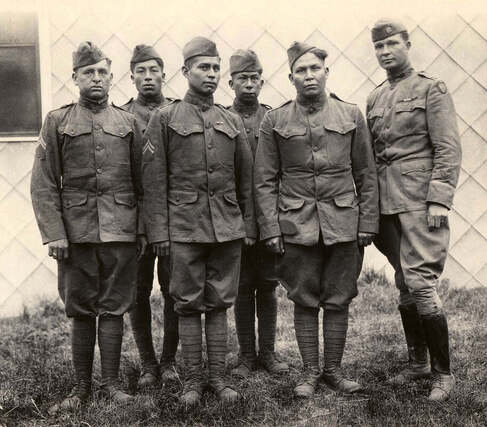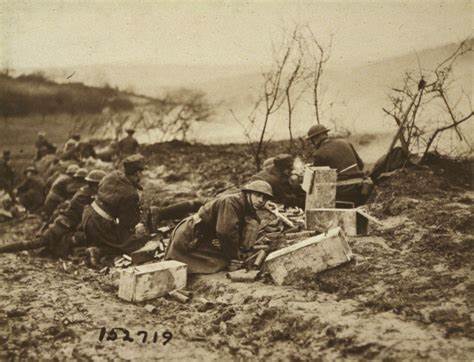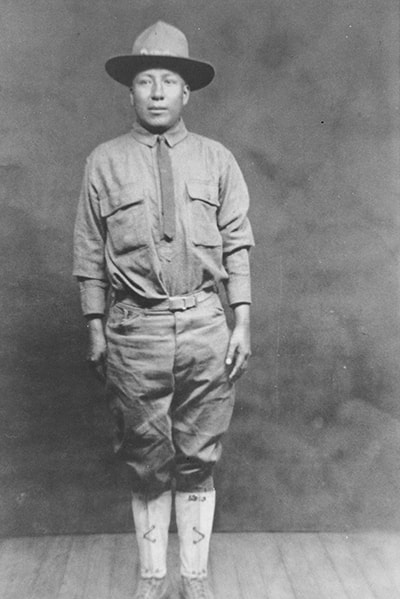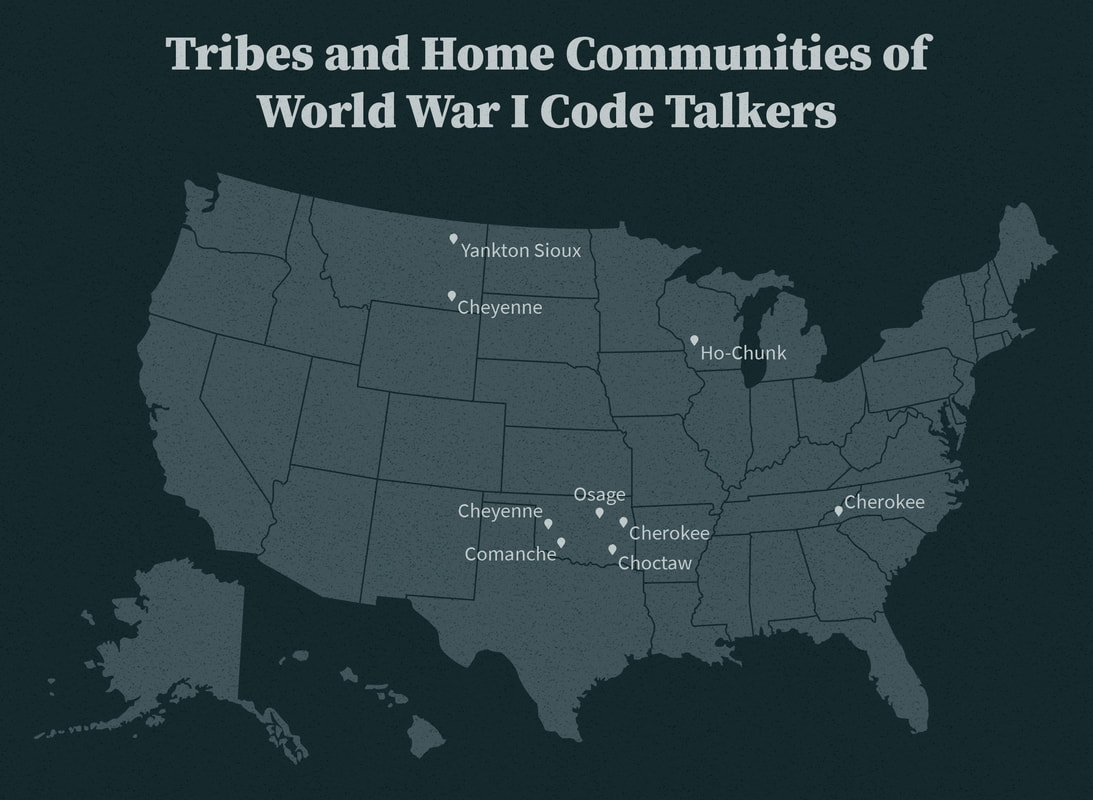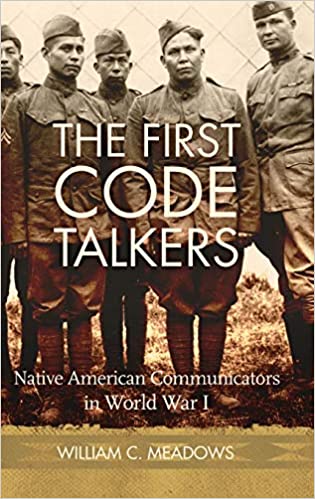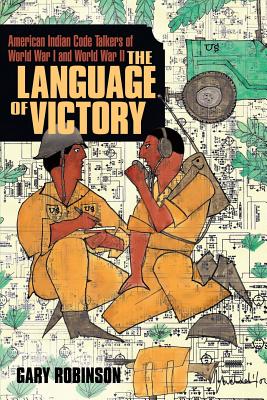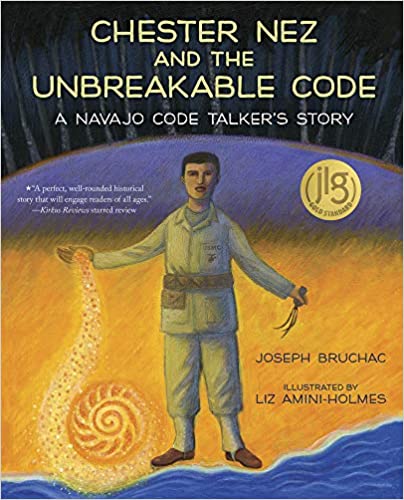|
Congress set a side a particular day, August 14th, to honor and remember the Navajo Code Talkers, Native American men who developed codes using the Navajo language to help win WWII. Still, even now, much of the code talker story remains shrouded in history. The Navajo Code Talkers contributions to the victory in WWII was kept secret until the war department declassified the program in 1968. Since then, their story has become known around the world, but code talkers came from as many as 34 Native Nations, and the first to serve were Choctaw, in the First World War! If not for a chance circumstance, when an US officer overheard two Choctaw soldiers speaking their language, WWI might have turned out differently. The American Meuse-Argonne Offensive in 1918, stretched along the entire Western Front and became the largest and deadliest battle of WWI. In the end, Germany was forced to surrender and the war ended, but the outcome was not certain at the start of the 47 day battle. As fighting began in the Meuse-Argonne region, the Germans had broken all Allied communication codes and were intercepting radio transmissions and telephone calls. The army sent runners to carry messages and the Germans captured 25-percent of them. The situation was desperate when an officer happened to overhear Choctaw soldiers speaking in their own language. At that moment he realized the possibilities. Germans would not know Choctaw! Within 24 hours, the Choctaw telephone squad was formed, locating Choctaws at the major command posts. They translated vital information about troop positions and supply routes into their language and transmitted it to other Choctaws who translated it back to English. A company made up entirely of Native Americans in the 142nd Infantry Regiment, 36th Division, included men who spoke 26 different languages and dialects. Two Indian officers were selected to supervise the new 18-member communication system. All were born in the Choctaw Nation, a self-governed republic in the Indian Territory, now southeastern Oklahoma, The timely change in US military code led to victory in the battles of St. Etienne and Forest Ferme leading up to the Armistice November 11, 1918. There are so many interesting aspects to this story, including the context of boarding schools, where Native children were beaten for speaking in their own language. How must have they felt when suddenly the language they had been told to forget was needed to win a war? I ran out of time this week to include all that I wanted to tell you about Native code talkers who served the US military. I'll leave you with some book recommendations and follow up next week with more on this story. Meanwhile check out this book, just out from the University of Oklahoma Press. The First Code Talkers: Native American Communicators in World War I, by William C. Meadows is the first in-depth book about the earliest code talkers. According to the publisher, Meadows draws on "nearly thirty years of research--in U.S. military and Native American archives, surviving accounts from code talkers and their commanding officers, family records, newspaper accounts, and fieldwork in descendant communities [to explore] the origins, use, and legacy of the code talkers. In the process, he scrutinizes numerous misconceptions and popular myths about code talking and the secrecy surrounding the practice." A book suitable for teens, The Language of Victory: Code Talkers of WWI and WWII is written by Award-winning writer and filmmaker Gary Robinson (Choctaw/Cherokee descent) who has worked most of his life to create Indigenous content in dozens of Indigenous educational, informational, and documentary television projects. The Lanuage Victory features rare interviews with Comanche, Choctaw and Navajo code talkers, to recount how American Indian soldiers from twenty different tribes used their native languages to send coded military messages in two world wars that were never deciphered by the enemy and helped win American victories. And for children, Chester Nez and the Unbreakable Code: A Navajo Code Talker's Story by Joseph Bruchac, a highly acclaimed Abenaki children's book author, poet, novelist and storyteller, as well as a scholar of Native American culture. "Bruchac movingly draws a parallel between the trauma of indigenous boarding schools and war. Amini-Holmes's paintings capture the nightmarish atmosphere of both."―Publishers Weekly Chester Nez was not his real name. That's the English name he was given in kindergarten when he was forced to go to boarding school at Fort Defiance. He could only whisper his native language, for if the Navajo students were caught speaking their language, they'd be punished. The Indian boarding schools were a tool used to the U.S. government in its effort to destroy Native culture and traditions. Despite this treatment, when his country needed him after Pearl Harbor, Chester answered the call, for the Navajo have always been warriors, and his upbringing on a New Mexico reservation gave him the strength--both physical and mental--to excel as a marine, and use his once-forbidden language to help win WWII. STARRED REVIEW "A perfect, well-rounded historical story that will engage readers of all ages. A perfect, well-rounded historical story that will engage readers of all ages."―Kirkus Reviews "Bruchac distills his extensive knowledge about the Navajo code talkers in this complex biography for young readers."―Booklist "A can't-miss picture book biography."―School Library Journal Next week, more about the Navajo Code Talkers and how after the war, they had to fight for their right to vote. Sources
https://www.okhistory.org/publications/enc/entry.php?entry=CO013 https://www.choctawnation.com/history-culture/people/code-talkers https://nativeamericatoday.com/the-native-american-warriors-in-the-u-s-military/ https://americanindian.si.edu/nk360/code-talkers/introduction/ Comments are closed.
|
I'm fascinated to discover little-known history, stories of people and events that provide a new perspective on why and how things happened, new voices that haven't been heard, insight into how the past brought us here today, and how it might guide us to a better future.
I also post here about my books and feature other authors and their books on compelling and important historical topics. Occasionally, I share what makes me happy, pictures of my garden, recipes I've made, events I've attended, people I've met. I'm always happy to hear from readers in the blog comments, by email or social media. Archives
September 2023
Categories
All
|
